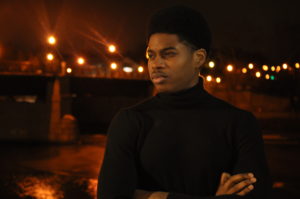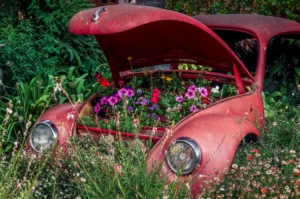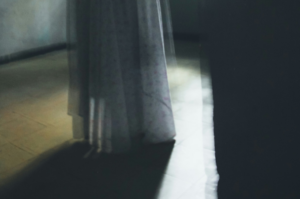
“Neli and I opened another bottle of wine, and tried to make up a story for our new friends. Neli thought they were both divorced. I thought the man’s wife was dead.”
I was in the checkout line at the pharmacy. There were two women in front of me. They were talking.
The older woman said, “Darling, I can’t stand Joburg. The blacks here are so rude.”
The younger woman said, “Ah, yes. The clever blacks.”
“Darling, I can’t stand them!” the older woman said.
The younger woman smiled. She shrugged and she said, “At least the blacks back home in Cape Town are well behaved. At least there they know their place.”
I had to do something.
So I coughed. And when they turned around to face me, I put my hand on my chest.
I said, “My god, how rude of me.”
Both women froze. Their faces grew pale. The older woman clutched her purse. She whispered to the younger woman, “You see, Mary Ann, you see it right there, you see what I was talking about?”
I started giggling. I said, “You shouldn’t speak that way, especially in a store filled with blacks. It’s dangerous. You never know who might be listening.”
The older woman eyeballed me. “No one was talking to you.”
“You were talking to the entire store,” I said, and the one or two people who were listening laughed. I laughed with them. I said, “I’m sure the blacks back home are wonderful, but, darling, I’m afraid it’s only a matter of time before us Joburg blacks teach them all about our poor manners.”
The women glared at me. The younger woman, Mary Ann, was sweating. Her eyes were glazed. She said to me, “Let’s just leave this alone, hey?”
Her demeanour struck me. It was so timid, and so feeble. I felt sorry for her. In fact, I felt deep empathy for her. I thought, wow! How pathetic it must be to live one’s life in resentment, and to believe one must diminish another’s humanity to uplift one’s own. It must be terrible.
I said to her, “It’s okay.” And I meant it. But the older woman kept muttering and mumbling and swearing at me under her breath.
“Stupid blacks,” she said. Her cheeks trembled. Stchupid bleksz. Spit collected in the corners of her mouth. “Bloody clever blacks.” Her thin body shook with every word. Bladi cleva bleksz.
I let her under my skin.
I said, “It’s not every day that I barge into the conversations of strangers. But I’d rather be rude than racist.” I said this in a voice that was too loud. I said it in a way that promised violence. I forced eye contact, peered into the hearts of those women, and spoke the word—racist—from a place of deep ancestral hate: a place of darkness within myself that I did not know.
The store fell quiet. All eyes fixed on Mary Ann and the older woman.
Someone said, “White people.”
The older woman said, “Don’t call me a racist!”
Someone else said, “I heard the whole thing.”
The older woman said, “I’m not a racist!”
Someone said, “You don’t get to decide.”
The older woman said to Mary Ann, but also to everyone else, “You see these clever blacks, you see how they behave!”
I felt sick. Mary Ann put her face in her hands and began to cry. The older woman continued to yell. People yelled back. I thought I might vomit.
A security man came over and demanded to know what the problem was. He looked at the crying Mary Ann and smiled. He said, “What must I do?”
The entire scene was so vulgar, so primal. I wanted nothing to do with it. I put my shopping basket on the floor, stepped out of the checkout line, and walked out of the store.
I found the public bathroom and locked myself inside one of its stalls. I sat on the toilet lid and wept. I wept for myself, and for Mary Ann and the old woman. I wept for the people in that store, for South Africa and Southern Africa and the wider Africa and for all the people in the world. I wept in anger and in helplessness and in frustration, and then I wept in shame, for being so thin-skinned.
I dried my hands under the blow dryer, and left the mall through the main exit.
When I got home, Neli was reading a book on the balcony. I sat down beside her and told her what happened at the pharmacy. I left the bathroom out of the story, of course.
Neli thought it was funny, and sad. She said, “Did you at least get your things from another shop?” And when I shook my head, she laughed. I liked the way Neli laughed at me. She laughed at me like it was baby’s first time eating a lemon.
It felt good to be home. It felt safe. I said to Neli, “I feel foolish.”
Neli said, “Everyone gets angry.”
I told her, “I knew better.”
Neli said, “We all know better, and half the time it doesn’t stop us. We stand where we are, look around, and we give people value. We define their humanity, or lack of it, according to our worldview. We say, these people are racists so we are better than them; these people hate women so we are better than them; these people hoard all the wealth so we are better than them. We never look at ourselves. A better approach might be to recognize that we’re not all the same, but we’re all on the same team.”
Neli leaned over the balcony to see the people and cars on the road below. She let the wind blow through her hair. She said, “It’s going to be a cool evening. I’m getting us drinks. Wine or water?” I asked her what she was having. She said wine, so I said I would have wine too.
She left and returned holding a bottle in one hand, and two wine glasses in the other. She poured. We drank. We watched the moon reveal itself in the dimming sky, and I considered how grateful I was for Neli, and wine, and an apartment with a balcony large enough to sit and drink on.
I said to Neli, “When was the last time you cried—really bawled your eyes out?”
“Oh god,” she said. “I don’t know, maybe two or three months ago.”
I asked her what happened. She poured herself some more, settled back into her seat, and said, “Why do you want to know?” I told her I was curious and she said okay, but that it was going to be a long story. I told her we had time.
Neli said that six months ago, one of the workers at the cement factory she interned at came into her office. It was a Thursday morning, and the man must have been in his late fifties or early sixties. He had short white hair and limped. He told Neli that his wife ordered him visit the clinic because the rash on his neck had started weeping.
It was clear to Neli, however, that the man was ill with much more than a rash; that he was dying. She said she knew it without testing him.
She said, “He was coughing, blood. He was thin. His skin was a mess. I said, Papa, I can give you something for the eczema, but first I need to ask you some questions. He said, ‘Okay, sister, sure-sure,’ and I asked him if he’d ever been tested for HIV.”
Neli finished her wine. She poured herself another glass, reached across the table and refilled my glass. I thanked her. She said, “I’m not supposed to talk about my patients outside the clinic. I feel bad.”
“You already started. Might as well finish,” I said.
“I guess you’re right,” she said. “Well, the guy, the man, he had never been tested. His wife had taken a test a long time ago, and she was positive, but the two had continued sleeping together without protection.”
“Of course,” I said.
“He knew,” she said. “His tests came back hot. TB, T-cells in the single digits, emphysema from thirty years of inhaling cement dust. I wrote him a referral and told him to see Du Preez, the floor manager, to have the referral signed.” Neli’s gestures grew larger, more urgent. She said, “Imagine Du Preez sends him back to me with a note saying the company doesn’t cover healthcare for floor hands.” She emptied her glass and pointed at me like I was Du Preez. “I said to the bastard, this man has been hauling your cement for almost all of his adult life.” She pointed at the empty chair on the side. “You watched him fall ill, you let him keep working, which is illegal, by the way, and now that he’s on his last legs you don’t have the moral will to sign off a handful of antibiotics for him to die in his sleep without pain.”
Neli was as furious in that moment as she had been when Du Preez told her to look around the factory floor. She mimicked his thick accent. She said, “He told me, ‘They’re all sick. If I pay for one sick hand, then I have to pay for every single sick hand. I’d be out of business in a month.’ As far as he was concerned he was doing those men a favour. He said, ‘No one will hire them. All these men will be unemployed if I don’t do what I do.
“I turned in my transfer letter the next day. As for the papa, I found out he passed away two or three months ago. His daughter sent the message. They needed donations for his funeral.”
Neli smiled in the way we smile when it is not okay.
She said, “You’ve let me get drunk. This was your plan all along.”
The wine bottle was empty. The moon was full. I said, “Thank you for sharing that.”
Neli did not say anything.
I let my eyes wander over to the adjacent apartment building. There was an old couple sitting on the balcony of the penthouse there. They were smoking and talking, and though there was no evidence of it, I could tell they had also been drinking.
I pointed and said to Neli, “I’m going to make friends with them. We need to cheer up.”
Neli gave me a look. “Please don’t.”
I started jumping and waving and screaming. I leaned over the balcony as far as I could, “Hey!” All of Johannesburg might have heard me.
The couple turned to us. Neli clawed at my shirt. She cried out to them, “Ignore him!”
The couple started laughing. The woman pointed at us and said something to the man. The man laughed, said something to the woman, and then laughed again. He put his hands over his mouth and yelled at us, but we could not hear him.
I yelled, “What?”
He yelled, “What?”
I yelled, “I can’t hear you!”
The windows around us began to light up.
Neli shook her head, giggling, and said to me, “You’re ridiculous.”
I yelled at the couple, “How many years have you been together?”
The old woman yelled, “We just met!”
The old man yelled, “We’re getting married!”
Neli yelled, “Congratulations!”
Someone yelled, “Shut up!”
We all cried, “Sorry!” And the four of us laughed.
The old couple stepped off their balcony. Their lights switched off. Neli and I opened another bottle of wine, and tried to make up a story for our new friends. We agreed that they had each been married before, and had five or six adult children between them. Neli thought they were both divorced. I thought the man’s wife was dead. We decided that he was a retired pilot and that she was into luxury real estate, and that they met years ago on a flight from France, but thought nothing of it at the time. I wanted to know if they had any pets.
Neli said, “They’re obviously dog people.” She swung her glass and spilt wine on the carpet. “And now that they’re getting married they have to sell the dog, because she’s selling her house for being too big, and he can’t have pets in his penthouse.”
“Correction! Can’t have pets on four legs.” I wagged my finger in her face. I said, “I’ll have you know that they placed an order for five fantail goldfish just last week.”
Neli said, “Mmm, yes. I stand corrected.”
The doorbell rang.
Neli and I looked at each other, grinned, and burst out laughing. The doorbell ding-donged again. Neli said, “I’ll get it.” She ran over, and came back, arms linked, with our new friends.
The man’s name was Arthur and the woman’s name was Marie. Arthur’s moustache looked like a bicycle’s handlebars. His eyes were soft and very kind. Marie’s hair had once been black, but you would not have known it, because the hair was now all different shades of grey and white. She spoke with a French accent.
Marie said, “We come bearing gifts!” She pulled her hand out from behind her back to reveal a dripping champagne bottle.
“We’ve been drinking all night,” I warned them.
“As have we,” Arthur assured me.
The four of us moved the party to the balcony, where we sat, Arthur and Marie on one side, and Neli and I on the other.
Their real story was nothing like we had imagined, though every bit as absurd. They had found each other on the Internet, messaged back and forth for two years, fallen in love, and finally decided to meet in person. They were both Belgian, but Arthur had spent the last nine years training polo ponies in Johannesburg; and before that he worked twenty-five years in Spain as a vet for bulls used in bullfights.
He said, “I gave it up after seeing my mother’s ghost weeping over the body of a slain bull in a dream.” He raised his glass to the moon. “To the bulls!” he declared.
“To the bulls!” we sang.
Marie had lived a different sort of life from Arthur. Her grandfather had left her too much money in his will, and most of Marie’s time went to deciding which orphanages and charities she wanted to support. “It’s harder work than you’d imagine,” she told us. And I think we all wanted to believe her, though I suspect none of us did.
Marie had no pets or children, and neither did Arthur, but now they had each other. “If there’s one thing I’ve learnt,” she said, “it’s that we become the people we give our attention to. Arthur has a great sense of humour, and he’s such a good man.”
“Thank you,” Arthur said to her.
“You’re welcome, dear,” she said to him. “My sister doesn’t like the idea of me being in a relationship so late in the game, and especially with a younger man.”
“By two years!” Arthur said.
“Still,” Marie said. “My sister—and I don’t want you to get the wrong impression of her—but she wants me to accept that my ship has sailed, which is absolutely ridiculous, because I’m not the one still married to a man I fell out of love with two decades ago.” She spoke these words without the slightest hint of malice. She said, “I’m the happy sister who waited it out, and found love in the end. And I’m happier by the day for it.”
“That’s beautiful,” Neli said, and looked at me. I nodded in agreement.
Arthur rose from his seat. “To being happier by the day!” he announced.
Neli held my hand under the table. She raised her glass and I raised mine, as did Marie and Arthur. Marie said, “One, two, three.”
And the four of us toasted, “To being happier by the day.”
**************
About the Author:
 A. E. Nelson was born in Lagos, Nigeria. He graduated from University of Rochester in 2015.
A. E. Nelson was born in Lagos, Nigeria. He graduated from University of Rochester in 2015.
*****
Post image from Flickr.









Chidera April 27, 2017 13:20
I love this story ☺ ☺